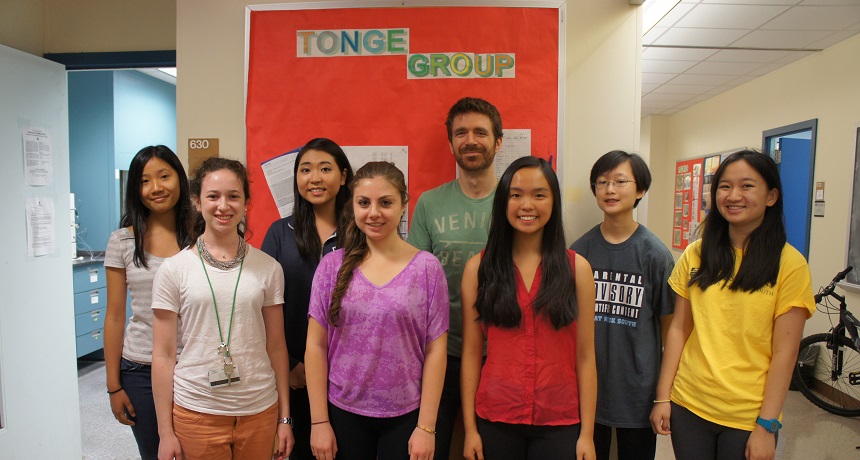Scientists who open labs to teens promote STEM inspiration
Taking a high school student into the lab offers not only valuable experience, but also inspiration

Every summer the Tonge lab at Stony Brook University swarms with high school students. This year's crop with their teacher James Truglio, from left: Annabelle Ng, Brooke Ferber, Robbin Jang, Courtney Schwart, James Truglio, Samantha Ng, Melody Yang, Lucia Geng.
P. Tonge
“I really enjoy my job and I think I should transmit that interest and excitement to students,” says Peter Tonge. He’s a chemical biologist at Stony Brook University in New York. And when he talks about students, he doesn’t just mean college and graduate students. This summer, he’s got six or more high school students working in his lab. Some are just rising sophomores.
Many university scientists might think that 14 is too young to taking on difficult experiments. But Tonge argues that the sooner you start, the better. “Early scientific research teaches students whether they have the aptitude for it,” he says. “You have to go through the process of designing experiments and being faced with the disappointment of them not working.” Some people aren’t cut out for that. But it’s not something you’ll realize, he says, until you face it.
High school teens come to his lab every summer. Some take part in research for just a few weeks. Others stay for months. Some work on molecules that respond to light. Others might try to make drugs to kill harmful bacteria.
James Truglio, a biology and science research teacher at nearby Great Neck South High School, brings many of these teens to Tonge’s lab to learn the basics of scientific research. A few of those students return year after year to take on projects with graduate students in Tonge’s lab, while other go on to do research in other local laboratories.
A few students arrive via the highly competitive Simons Summer Research Program. It places 35 to 40 students each year in Stony Brook research labs. High schools across the country can nominate students to take part.
The occasional teen even gets a spot after contacting Tonge directly. “Each year I get emails from high school students across Long Island asking if they can do research,” he says. With each applicant, Tonge looks for a spark of curiosity and persistence that tells him this teen is very driven. “It’s just like an application for any other job,” he says. “You can tell if someone just put your name at the top of a form letter. The best students will have read some of the papers my lab published and will have specific questions.”
Truglio says that students applying to work in labs have to be very driven — because they’ll face a lot of rejection. “I work with the students to make sure they reference work from the scientist’s lab, and to make sure there are no typos,” he says. “But it’s endless no’s before you get a yes. Many of my students send 50 to 70 emails.” Along the way, he acknowledges, students may end up discouraged.
There are many reasons why a scientist might not want a high school student in the lab for the summer, Truglio says. “Some have had bad experiences, and some labs are just beyond the level that a high school student can handle.” He also says that when professors get more than 100 emails from hopeful high school students, they may end up feeling spammed. But if a scientist is willing to take a high school student, they could inspire a student into a new career.
The experience also provides valuable training for younger scientists in the lab. Graduate students put in charge of a high school student will have to convey concepts clearly, motivate the younger students and stay organized. These are lessons that will translate well as those graduate students move on to careers of their own.
I got to talk to Tonge, to Truglio and to some of the students working in the lab this summer. In the next few posts, I will be sharing some of their experiences, how the students discovered scientific research and how Truglio helps many of his high school students find a research experience that changes their life.
Follow Eureka! Lab on Twitter
Power Words
biochemist A scientist who studies the chemical processes and chemical transformations that take place inside organisms.
biology The study of living things. The scientists who study them are known as biologists.
chemistry The field of science that deals with the composition, structure and properties of substances and how they interact with one another. Chemists use this knowledge to study unfamiliar substances, to reproduce large quantities of useful substances or to design and create new and useful substances.
molecule An electrically neutral group of atoms that represents the smallest possible amount of a chemical compound. Molecules can be made of single types of atoms or of different types. For example, the oxygen in the air is made of two oxygen atoms (O2), but water is made of two hydrogen atoms and one oxygen atom (H2O).